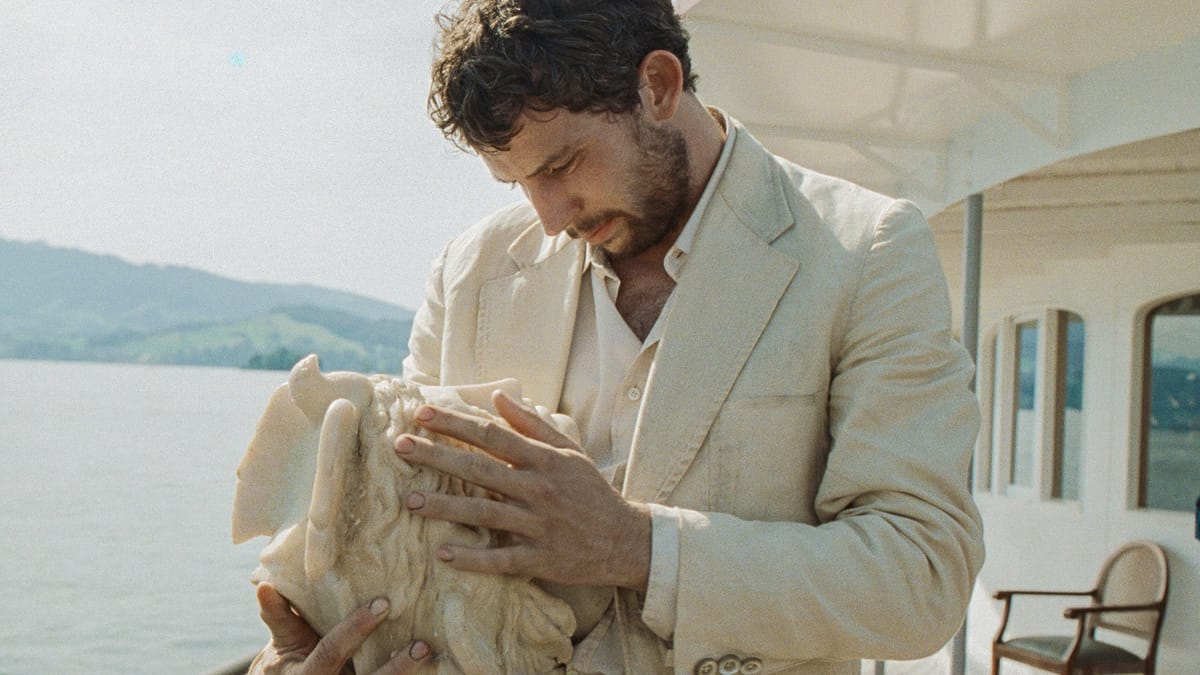La Chimera
Tired: Josh O'Connor playing tennis. Wired: Josh O'Connor robbing graves.

In some ways, it’s a familiar story. A criminal who becomes more conflicted about his work following a stint in prison after taking the fall for his friends. Adding to his doubts are some signs that he could enjoy another, simpler life, specifically with the company of a romantic interest. Of course, she doesn’t know what he does, not because of any particular subterfuge on his part, it just hasn’t come up. So part of the tension is wondering how she’ll find out, and what her reaction will be.
However, something about La Chimera feels different. Maybe that they’re looting old graves in search for authentic Etruscan artifacts. Maybe the mystical method employed by Arthur (Josh O’Connor) to locate said graves, remarked upon in passing but never explained despite the fact it seemingly works in a world otherwise devoid of magic, a situation emphasized by the inversion of the frame as he teeters then collapses, signalling his crew to begin digging. Or maybe it’s that the movie seems to be instructing us to doubt Arthur’s doubts, that despite the distraction from his work he also cannot seriously entertain leaving it…until he does.
He’s not doing this for fame or money or luxury, that’s for sure. While his mentor, mother figure, and close friend Flora (Isabella Rossellini) lives in a sprawling villa, and his companions live within the walls of the protected village in which she resides, Arthur is slumming it, seemingly by choice. He lives in a shack on the other side of the wall, if by “shack” I mean “two pieces of sheet metal leaning against the wall, with a makeshift range on top of a propane tank doubling as cooking implement and heater”. A functional if literal visual signifier of his status in the group, even as he’s simultaneously their most important member.
All is used to wonderfully and naturally weave together its themes of people hunting for their own personal treasures, explored through various plot threads. Love lost to tragedy, the hope of a new romance, the chance for a big score, even just vicarious legacy. All are dazzling, potentially transformative, and always just out of reach. As we near the climax, we’re asked to consider what achieving these goals would really look like. What would it actually mean to each person? Could it ever truly make them happy? Could it ever live up to their expectations? Or is the thing they truly value the chase itself, eternally and intentionally (if subconsciously) positioning themselves in ways that frustrate progress? The proverbial dog chasing cars, if you will.
Most emblematic and compelling of all these is the blossoming relationship between Arthur and Italia (Carol Duarte), Flora’s housekeeper. She’s fascinated by the appearance of this grimy stranger who speaks Italian with a clear English accent, mispronouncing “eyes” as “hyes”. He seems taken with her ability to glide around unnoticed, hiding the presence of her children from Flora for quite some time. There’s no love at first sight, no passionate declaration of affection. Rather, they stumble into love: they’re just two people slowly spending more and more time together, realizing how much they enjoy that time and how free it makes them feel. And we love them, too: despite both being somewhat reserved and mysterious and not wanting to talk too much about themselves, the chemistry they share bleeds off the screen, in part as we feel their effect on each other, and contrast Arthur’s relaxed body language to the tension present with his crew. Making the the quietly devastated expression that befalls him when he learns she’s left Flora’s household hit even harder, as he’s no idea where to find her.
All of these threads set up and drive towards dramatic climaxes in the latter chunk of the film, deftly weaving together and syncing en route to the inevitable conclusion. Even as you can often predict the beats to come, they’re no less effective for it, in large part because their aftermath is less clear. For example, almost as soon as we meet Italia, we learn she’s hiding her children from Flora. So by the “rules” of storytelling, you can guess there will be a dramatic beat when Flora discovers them. But we don’t know Flora super well, only the way she lords over her biological family like a mafioso. and their resentment of her affection for Arthur. So how will that discovery play out? And how will it ripple throughout the film? This is the primary mechanism by which writer/director Alice Rohrwacher strings us along, spinning her tale of life in the Italian countryside.
La Chimera is more than the sum of its parts, featuring endlessly captivating characters and relationships, wonderful stylistic technical flourishes, and a rural side of Italy rarely seen in films which make it to the US. It’s chock full of strong performances, from the leads to his crew to small roles showing up for a single memorable scene, including one with the director’s older sister Alba. All of it culminates in a final shot that hits you like a ton of bricks, bringing all the themes and events home in a beautiful yet minimalist way, echoing the opening shot to bring us full circle. It’s beautiful, it’s intimate, and it’s poignant. What more could you ask for?